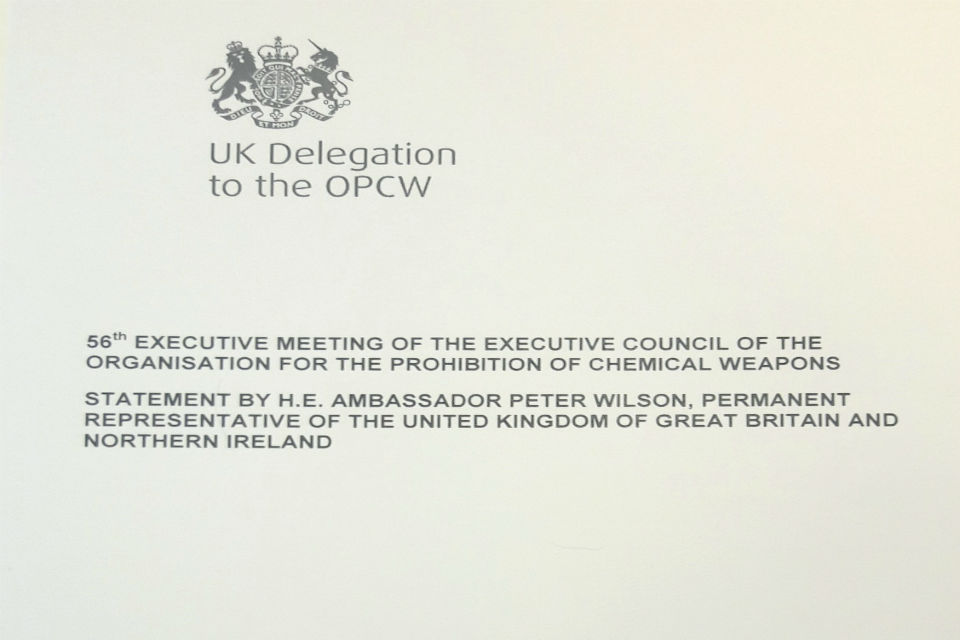56th Special Session of OPCW Executive Council
Statement by H.E. Ambassador Peter Wilson, UK Permanent Representative to the Organisation for the Prohibition of Chemical Weapons.

Thank you Mr Chair,
The UK supports Estonia’s statement on behalf of the EU. Foreign Ministers of the UK, US, France and Germany made a statement last night, we will circulate it today. Others will seek to obfuscate. I am going to be brief because this is important, and it is time to be very clear.
Thanks to the OPCW-UN JIM we know what the Syrians did, and we know what Daesh did. The regime used sarin against its own people at Khan Sheikhoun on 4 April. Daesh used mustard gas in Sept 2016 at Um Hosh.
Today we should also remember what we did. The OPCW Director General set up the Fact Finding Mission in 2014 to investigate chemical weapons use in Syria. The UN Security Council set up the JIM to identify the perpetrators. We took action here last year on the basis of the JIM’s report that found the Syria had used chemical weapons on three occasions, and that Daesh had used them once. Why? Because, in the words of the Russian Representative in New York earlier this year, chemical weapons was the last taboo. This was the one Syrian issue on which the US, Russia and the rest of the UNSC was able to agree on, in the autumn of 2013, when it could agree on nothing else.
Since 2013, chemical weapons have been used not once, but many times. Sarin alone has been used to kill on at least three occasions: Ghouta 2013; Khan Sheikhoun in April 2017; and, as confirmed by the Fact Finding Mission last week, Al Ltamenah in March 2017.
So, let’s now look at what the regime and its allies have done.
a) They have failed to comply with the treaty they signed. Syria’s Declaration is still incomplete – and clearly Syria has NOT handed over all its chemical weapons stock, as it claimed to in 2014.
b) They have created the most elaborate possible, and ever changing, narrative to explain the Khan Sheikhoun attack. But the samples from Khan Sheikhoun that Syria handed to the Fact Finding Mission contained their own regime sarin signature!
c) Russia vetoed the extension of the JIM mandate, in New York just last month.
So the question for this body is what do we do now?
We should be clear, as the OPCW, that we look to the UNSC to renew the mandate of the JIM. No ifs, no buts, and no skimping on the mandate. It must be able to do its job. The perpetrators of the Al Ltamanah sarin attack must be identified. It looks to us like a horrific pattern of tactical sarin use.
The OPCW’s Fact Finding Mission must continue its work to investigate other allegations of chemical weapons use in Syria. The Declaration Assessment Team must continue to address serious outstanding concerns about Syria’s declaration. This includes very pertinent questions directly related to sarin and its precursors, and to unaccounted for aerial munitions. So:
i) We - this Executive Council, and all 41 members in it, must condemn the use of chemical weapons, clearly and unequivocally, and those who have used them as identified in the JIM mechanism that was established by unanimity. Again, no ifs, no buts.
ii) We must support further work by the FFM and the JIM, to establish facts, and hold perpetrators to account.
Russia and Iran have given us a different choice today. The text they tabled yesterday seeks to politicise the body that every country in this room is committed to support. It is a thinly veiled attack on the professional integrity of the Director General. It seeks to undermine the technical capability and competence of the Technical Secretariat.
We can, and we must do better than that. We should agree to take action, to condemn perpetrators and support the Convention. And we should do it without delay.